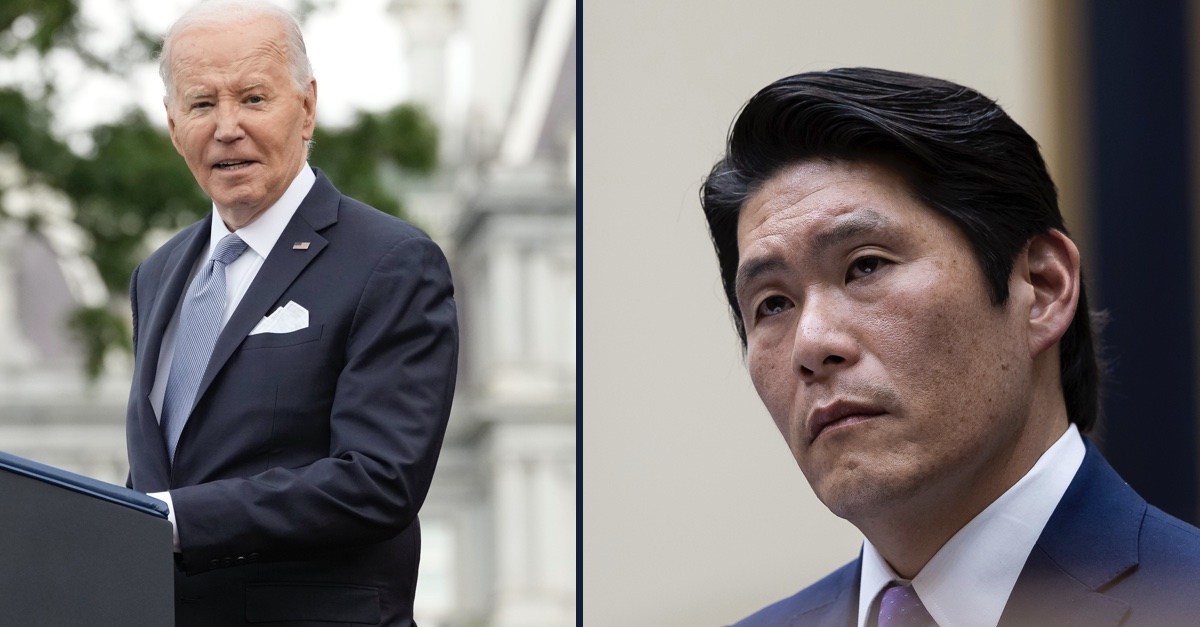
President Joe Biden (left) speaks on May 23, 2024. (AP Photo/Jacquelyn Martin); (right) special counsel Robert Hur testifies before the House Judiciary Committee on March 12, 2024. (Francis Chung/POLITICO via AP Images)
A federal judge in Washington, D.C., appointed by former President Donald Trump refused to let a conservative group speed up a Freedom of Information Act (FOIA) lawsuit that seeks to obtain audio tapes of President Joe Biden’s interview with the special counsel who declined to charge him for possessing classified documents after his vice presidency ended.
U.S. District Judge Timothy Kelly was unswayed by the Heritage Foundation’s arguments that Biden’s decision last week to invoke executive privilege over the Robert Hur tapes should lead the jurist to expedite a briefing schedule on an emergency basis.
As Law&Crime reported at length earlier in the week, the Heritage Foundation, Judicial Watch, and a collection of mainstream media organizations are all suing to get their hands on the audio tapes of Biden’s five-hour interview with special counsel Hur.
When Hur released his report on the Biden investigation, he said that while Biden “willfully retained and disclosed classified materials,” a jury wouldn’t want to convict the president, whom he called a “sympathetic, well-meaning, elderly man with a poor memory.”
Hur also took into account the differences between the facts in the Biden case and the alleged facts in Trump’s Mar-a-Lago prosecution.
“Unlike the evidence involving Mr. Biden, the allegations set forth in the indictment of Mr. Trump, if proven, would present serious aggravating facts,” the Hur report said, highlighting the differences. “Most notably, after being given multiple chances to return classified documents and avoid prosecution, Mr. Trump allegedly did the opposite.”
Conservative groups and the media have since each demanded the release of the Biden audio tapes, with the media coalition of CNN, ABC, the Associated Press, CBS News, The Wall Street Journal, NBC, Reuters, and the Washington Post raising the argument in a FOIA lawsuit that the audio “will shed light on Hur’s controversial characterization of Biden as an ‘elderly man with a poor memory[.]””
The White House, on the other hand, though it neither opposed the release of the Hur report nor the transcript of the interview, has taken the position that the audio tapes will only be used by House Republicans to launch political attacks on Biden’s age in an election year.
Late last week, in response to Biden’s executive privilege assertion, the Heritage Foundation asked Kelly to set an “expedited briefing schedule.”
“[T]he fact that the Committees have now been forced to recommend that the full House hold the Attorney General in contempt of Congress adds to the compelling and already extraordinary public interest in the disclosure of the audio recording of the President’s interview with Special Counsel Robert K. Hur,” the emergency motion said, citing the nearing election and the audio’s “clear public salience […] regardless of one’s political affiliation or view.”
The DOJ shot back that Heritage has tried this tactic before without success and that the same result should happen the second time around. The DOJ emphasized that Biden’s executive privilege invocation only complicated matters and, therefore, should not be used to accelerate the case.
“The Department still must prepare a summary judgment motion explaining why the Department can properly withhold the materials consistent with the FOIA. In doing so, the Department must develop numerous legal arguments and must support its factual assertions with an appropriate declaration or declarations,” the DOJ said. “Indeed, it will now need to do so accounting for the presidential assertion of privilege. This arguably would militate for more time, not less, although the Department is not seeking that.”
Judging by his order Tuesday, Kelly agreed that an expedited schedule would not be helpful, as even Heritage’s ally in the litigation acknowledged.
“Heritage argues that modification of the briefing schedule is warranted because President Biden asserted executive privilege over the relevant audio recordings in response to congressional subpoenas, which somehow shows that the Government does not need much time to prepare its briefing in this case,” Kelly said. “The Court disagrees.”
Although Biden’s executive privilege move is “obviously relevant,” the Heritage Foundation did not show the president’s decision “substantially lessens the Government’s obligations in preparing its summary judgment motion and other filings in this case,” the judge wrote.
“The Government must still develop and brief FOIA arguments and prepare declarations that have nothing to do with executive privilege,” Kelly said. “Indeed, that the President has invoked executive privilege may increase the complexity of the Government’s task.”
The judge noted that fellow conservative group Judicial Watch told the court that the expedited schedule proposed by Heritage would be “extremely difficult” to operate under.
“In the end, nothing in Heritage’s motion suggests that any change to the briefing schedule is necessary,” Kelly concluded.
Have a tip we should know? [email protected]






